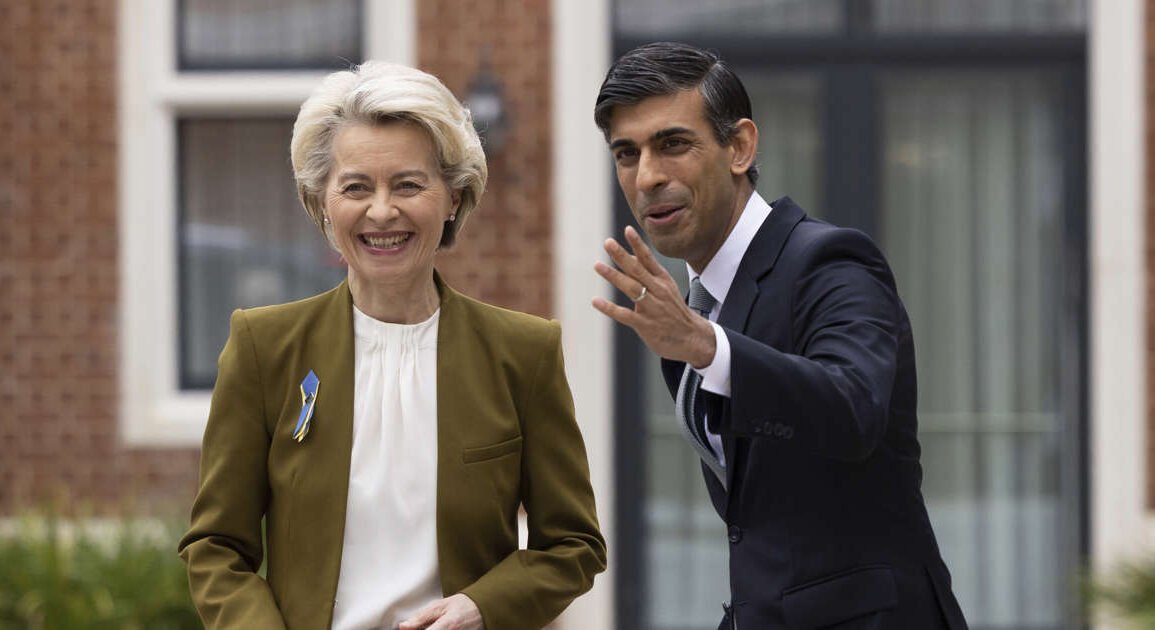The European Union and the United Kingdom reached an agreement on Monday on the thorny issue of the border between Ireland and Northern Ireland, a problem that has poisoned relations after Brexit for the last two years. The pact has been sealed by the president of the Commission, Ursula von der Leyen, and the British prime minister, Rishi Sunak, during a meeting in Windsor.
The British prime minister still faces the most difficult task: selling the pact to the most eurosceptic current of his own Tory party, led by his predecessors Liz Truss and Boris Johnson; and the Northern Irish unionist party DUP, which is blocking the formation of the regional government by demanding that the Northern Ireland protocol be amended or abolished.
The problem derives from the type of hard Brexit that Boris Johnson chose, which has meant the UK’s exit from both the customs union and the single market. To avoid a physical border on the island of Ireland (which would jeopardize the Good Friday Peace Agreement), the then-British Prime Minister approved a special status for Northern Ireland, which is still bound by the rules of the internal market of Ireland. the EU for goods.
This means that, in practice, the border has been moved to the Irish Sea, with new customs and phytosanitary controls on products arriving at Northern Irish ports from the island of Great Britain. The new border has angered Northern Irish unionists in particular, who charge that it endangers the territorial integrity of the United Kingdom.
The dispute has come close to sparking an open trade war between Brussels and London. Johnson (and later Truss) began to process a law that allowed the British government to bypass the Northern Ireland protocol and unilaterally abolish controls. An initiative against which the Commission took legal action, considering that it violated international law. Sunak’s coming to power first made it possible to reduce the tension and then seal this agreement.
What is the solution that Von der Leyen and the British Prime Minister have found? In Brussels, the level of secrecy is maximum, but in London, the central pillars of the agreement have leaked, which would be three: the reduction and even suppression of customs and phytosanitary controls; the dilution of the role of the Court of Justice of the European Union as arbitrator of disputes; and more voice and vote to Northern Ireland when deciding the community rules that apply to it.
As for the controls, the pact is to create two separate lanes, one red and one green. Products from Great Britain destined solely for Northern Ireland will travel through the green lane, with fewer phytosanitary controls and customs red tape. Some controls that would be applied in the red lane to those products likely to enter Ireland and therefore into the single European market.
In addition, the pact between Sunak and Von der Leyen dilutes the role of the Luxembourg Court of Justice in resolving disputes over the Northern Ireland protocol, as demanded by the British. In the first instance, the Northern Irish courts will be responsible for settling disputes concerning the application of the rules. However, the CJEU retains the role of the highest decision-making body in the last instance, as the EU has always defended.
Just as the first anniversary of Russia’s war of aggression against Ukraine has just passed, the European Union and the United Kingdom are staging their reconciliation after Brexit, another example of the unity of the Western alliance against the Kremlin.





